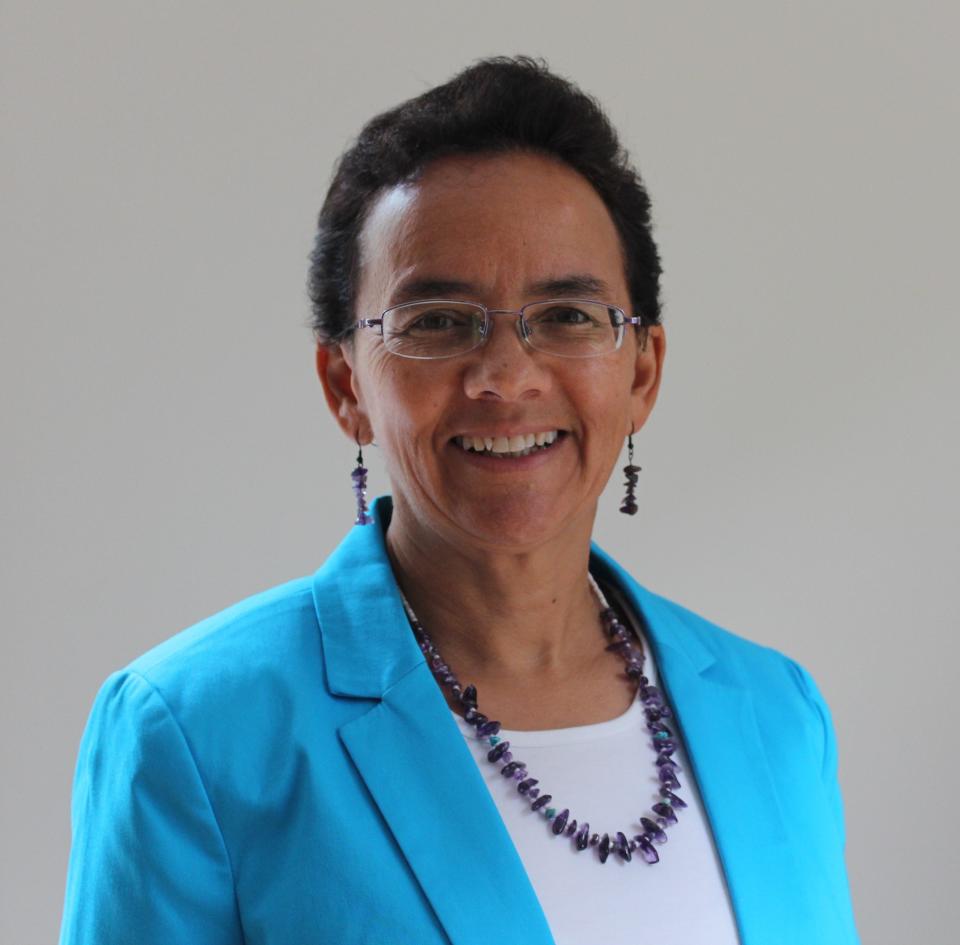Rape victims seeking help become suspects in false reporting claims, documentary finds
Despite high-profile efforts in the past few years to stop sexual violence against women, reported rape cases nationwide are being twisted by police, who turn the investigations on their head by accusing the women who reported sexual assault of making up their claims.
That's the premise of a recent, 95-minute Netflix documentary, "Victim/Suspect," and research by law professor Lisa Avalos, who is featured in the film and has shared her findings in various publications, including the Michigan Journal of Gender & Law, and in an interview with the Free Press.
Avalos said these cases — including some in Michigan — discourage rapes from being reported to police. She also urged more, and better, training for police investigators as well as the adoption of more safe-to-report policies that help protect victims from prosecution for lesser offenses, such as underage drinking.

"Imagine that a close friend is raped, and you encourage her to report it to the police," Avalos began the abstract to her 2016 paper, "Prosecuting Rape Victims While Rapists Run Free." She continued: "At first, she thinks that the police are taking her report seriously, but the investigation does not seem to move forward. The next thing she knows, they accuse her of lying and ultimately file charges against her."
Avalos makes the case that "this nightmare may seem inconceivable, but it has in fact occurred repeatedly in both the United States and Britain — countries that are typically lauded for their high levels of gender equality."
So while one survey finds that in the five years since #MeToo has gone viral, the percentage of American adults who have heard about the movement and support it is more than double the percentage of those who oppose it, Avalos said many people still don't believe women.
That disbelief, for instance, is what allowed Larry Nassar, a former sports medicine physician at Michigan State University and doctor for USA Gymnastics, to sexually abuse scores of girls and women for years under the guise of medical treatments.
His victims weren't prosecuted for lying, but the pattern that they were doubted is consistent.
Kyle Stephens, for example, told her parents that she had been abused. But instead of supporting her, Stephens said her father, who later took his own life, accused her of lying. In at least one news report, he told her she was the one who should apologize to her abuser.
How many cases are there?
"Victim/Suspect" follows Rachel de Leon, a journalist who worked with the Center for Investigative Reporting, as she crisscrosses the country to examine sexual assaults cases in which victims sought police help, only to be doubted, arrested, and often charged with a crime and jailed.
De Leon told the Free Press she found 188 such cases in news media reports in the past decade and more that were not covered for a total count of 236.

She offered more than a half-dozen cases in Michigan going back to 2017 in which women were charged with falsely reporting sexual assault. Of those, however, she did not identify which false reporting charges were legitimate and which were reasonably questionable.
In one Michigan case, a 21-year-old college student was accused of false reporting because her assault narrative was inconsistent each time she told it. In another, police couldn't find evidence of the accuser's account on surveillance video. And in a third, the accuser recanted her story.
In one case a victim accused a sheriff's deputy and another, a "male friend."
A 2018 BuzzFeed News investigation on the same issue also tallied news media reports. BuzzFeed went back to 2013. It found 127 women were charged nationwide with falsely reporting a rape. In the United Kingdom, where academic researchers first looked these cases, about 200 women were prosecuted for the same crime.
The BuzzFeed report, however, found that the rate of false reports of rape "has been studied more than false reports of any other crime," and yet it is difficult to get definitive stats: "researchers still haven't nailed down a precise percentage."
"I don’t think we have data on exactly how many of these cases are happening because nobody collects it," Avalos, now a Louisiana State University law professor, said, adding that makes it challenging to characterize how big of a problem it is. "But I would expect this has been happening for a long time."
Clearing cases vs. solving them
Avalos — who has been to Michigan several times in the past few years as one of her daughters earned a doctorate from Michigan State — has degrees in sociology and law. She has focused her study on these types of cases and has long had an interest in addressing sexual violence.
At LSU, Avalos organized symposia that invited speakers like Louisiana’s first lady Donna Edwards and Ingham County Circuit Judge Rosemarie Aquilina, who presided over Nassar's sentencing.
Avalos said these cases reveal a deep flaw in the justice system: Police and prosecutors are under pressure to close rape cases, but not necessarily solve them, allowing offenders to get away with their crimes while the victims have paid the price.
"We’re trying to make this happen less frequently," she said. "We’re trying to raise people’s awareness of it. I wouldn’t be surprised if the rates vary in response to different events, like there has been backlash after the #MeToo movement."
The #MeToo movement, founded by activist Tarana Burke in 2006, gained widespread popularity in 2017, when many, including Hollywood stars, encouraged women who were victims of sexual harassment and assault to post their stories on social media, according to Pew Research.
Pew, which reported on its survey last year, found 49% supported #MeToo and 21% opposed it. Moreover, seven in 10 adults — including majorities across partisan lines — said that people who commit sexual harassment or assault in the workplace are more likely to be held responsible for their actions.
And Pew found six in 10 said those who report harassment and assault were likely to be believed.
Omitting embarrassing details
Still, when it comes to arrests and allegations of false reporting, Avalos and de Leon found that some police departments don't believe victims, and that is one of a variety of reasons why the victims have become suspects.
Why?
"I think it’s a combination of factors," Avalos said. “We know for a fact that when sexual assault victims report it to the police, they are very frequently disbelieved, and that is something we are trying to change, but that disbelief is a big factor.
She said detectives start their investigations skeptical of the allegations that are reported.
As a result, they try to prove the woman’s allegations were false and don't investigate whether a rape occurred. Moreover, she said, the gender of the investigators and victims may play a role: The police are mostly men and victims are mostly women.
"But that’s not an absolute factor," Avalos said. "Men can do a fantastic job investigating sexual assault, and I know many men who do. And women can also throw victims under the bus. So, it’s not just that." The bigger factor, she added, is the culture within a police department.
And there's another consideration: When reporting sexual assault, a victim might be embarrassed or afraid to include in the account that she committed a lesser crime — such as underage drinking — or behavior that might be deemed socially questionable to others.
As a result, a victim might leave out, alter, or change details when initially recounting her story to investigators. That doesn’t change the truth about the sexual assault, but when investigators discover what they see as a lie, they begin to question the victim's entire account.
Better training, more discretion
When that happens, police may stop investigating whether a rape occured.
Instead, Avalos said, they begin to pressure the victim to recant their version of events, and the women do it, because they want that pressure to go away, which undercuts their initial report and leaves them vulnerable to prosecution.
Still, in fairness to investigators, false reporting does occur. One of the best known and historically significant false-reporting cases occurred in 1955. Emmett Till, a Black teen in Mississippi, was kidnapped, beaten, and shot in the head after a white woman, Carolyn Donham, accused him of assaulting her.
Then, in 2017, Duke University scholar Timothy Tyson, published a book, "The Blood of Emmett Till," in which he recounted in an interview with Donham — perhaps her only one — that she recanted her account and said she made a false accusation.
Ironically, however, news accounts have reported her husband, Roy Bryant, whom she divorced, was abusive, and his family hid her away initially, preventing her from talking to law enforcement, although she testified when the case was reopened decades later.
Donham died in April.
There are other cases in which the accusers lied.
Still, Avalos suggested that better training and understanding can help improve investigations.
Victims, she said, can seek support from a professional or volunteer advocate — who is not a parent or friend — before reporting the assault to police, and ask to have that person present in the room when giving their statement.
And, Avalos said, law and policymakers can do more to craft guidelines and legislation that will encourage more sex crime reporting, instead of less, and help protect victims from enhanced scrutiny and punishment for minor offenses.
For instance, the National Defense Authorization Act for Fiscal Year 2021, which applies to service members who are victims of sexual assault, removes some sex crime reporting barriers by safeguarding victims from disciplinary action for "minor misconduct" in the context of a sexual assault.
Such a policy also allows military commanders discretion in assessing whether an offense represents minor collateral misconduct, and urges them to consider mitigating factors, such as age, trauma, and circumstances, in the situation.
Avalos notes that false reports of sexual assault and domestic violence do not happen more frequently than the false reports of other crimes. A common false report, she said, is of cellphone thefts so phone owners can submit a replacement claim that would be covered that they'd otherwise have pay for on their own.
"I don’t see headlines about people who falsely report their cellphones being stolen being prosecuted for false report," Avalos said. "I think we’re concentrating on these kinds of prosecutions in relation to sex crimes and it’s like we are punishing victims for coming forward."
Contact Frank Witsil: 313-222-5022 or fwitsil@freepress.com.
This article originally appeared on Detroit Free Press: In Netflix documentary, police accuse the rape victims of telling lies

